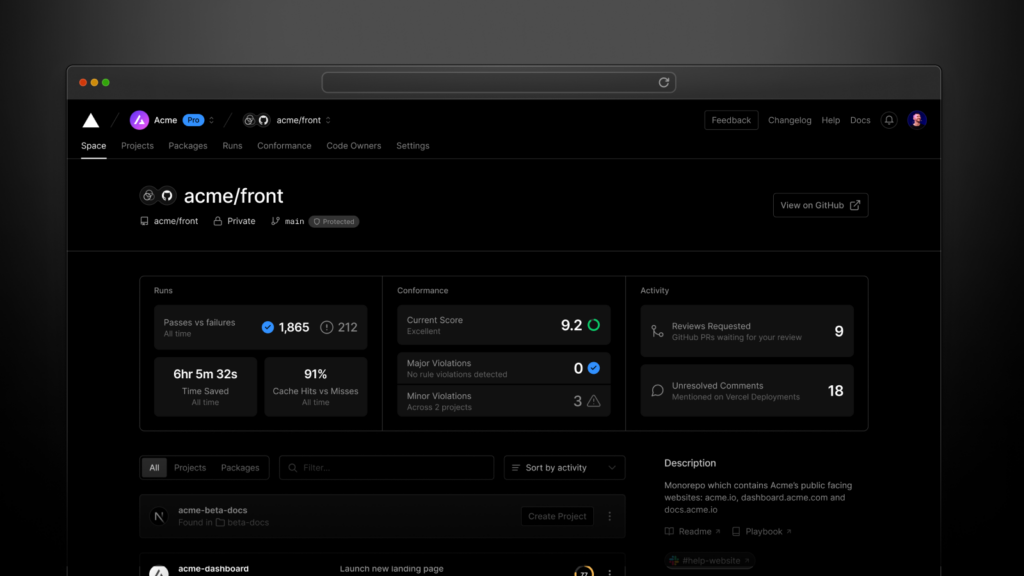
The hosting and Next.js company Vercel has introduced new services at its virtual Ship event under way this week: a suite of storage services with blob, Postgres and Redis-compatible key-value options; a new dashboard called Spaces for monitoring development workflows and code health; security services including a firewall and private network called Secure Compute; and a visual editing service for headless content management systems.
The storage services are offered via a partnership with Upstash for KV, Neon for Postgres, and Cloudflare for blob, while visual editing is co-developed with Sanity. Many of Vercel’s services are also hosted on AWS. This dependence on third party services has caused some developers to question whether Vercel is becoming too expensive versus using those services directly. A table posted on the web suggests that the Vercel markup for its added value can be up to 456% (Cloudflare R2 reads versus Vercel Blob reads).
DevClass spoke to Vercel CEO and Founder Guillermo Rauch to ask why launch all these new services? “We realized there was an opportunity to create a front-end infrastructure that was tailored to this new generation of frameworks,” he told us. “Whether it’s NextJS, whether it’s Nuxt, whether it’s SvelteKit. The early adopter of the cloud was interested in architecture, infrastructure, back-end development, languages like Java and .NET. [Today] it is TypeScript, UI engineering, and personalizing experience in design. There were no databases in the market that were really tailored to the needs of this front-end engineer.”
Since much of Vercel runs on AWS, including serverless functions, why is it not optimal to use AWS services directly for storage and database? “Vercel already intelligently co-locates your data with your compute … for example, we’re running your serverless function in AWS, the Upstash database is less than a millisecond away,” said Rauch. “The same is true for our blob store, we run Edge functions in Cloudflare. We’re giving the developer a programming model where they’re not having to think about regions, everything is global first.”

Vercel’s pitch is that despite the initial promise that cloud computing would simplify infrastructure management, platforms like AWS, Azure and Google Cloud have become too complex. “If cloud providers were already difficult for the average product team, imagine how dire the situation is when you’re looking at a globally distributed system. And that’s what it takes today in order to get the performance characteristics that businesses like e-commerce require. So Vercel is packaging all of this up for specific use cases,” Rauch told us.
Since applications on Vercel’s platform are designed to scale up seamlessly, what protection is there against bill shock when there is unexpected high traffic? Are there any guard rails? “We’re announcing Vercel firewall today as well, which is an integrated, automatically optimized solution for DDoS [Distributed Denial of Service] mitigation,” said Rauch. “We’ve invested in a lot of tools to make sure that bad actors cannot maliciously take advantage of this scalable resource. One weapon in that battle is security solutions and products which we’re bringing to market, and many of those are already automatically part of the platform.”
We are not the first to ask about this problem. Vercel VP of Developer Experience Lee Robinson said on Twitter yesterday that “the feedback is: more visibility into usage and more ways to control spending. And I think I haven’t done a job good about acknowledging this is very top of mind for me.”
He added that “Hobbyists don’t want to wake up to a large unexpected bill. That’s serverless in its worst form. But at the same time, businesses don’t want to wake up to their site offline. How do you build a platform that works for both of these customers?”
Robinson said that Vercel is working on “automatic recursion prevention in your functions. Mistakes happen, and you shouldn’t get charged for invalid usage.”
Rauch told us that real-time monitoring is part of the solution. “We give you real time observability over all your usage. This is quite unique because AWS for example gives you very staggered delayed data.”
Knowledge of costs does not address the matter of whether they are an acceptable price to pay for the added value of Vercel’s platform. An issue, perhaps, for Vercel is that ease of development and deployment is of most benefit to small-scale users that lack specialist teams, while large-scale enterprise customers have more to gain by investing in their own infrastructure management, even in a cloud context such as on AWS, and optimizing costs, making them less likely to use Vercel’s abstractions.
